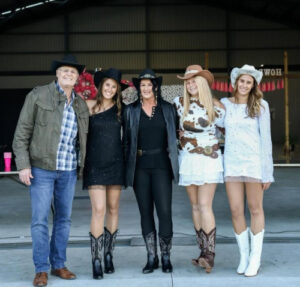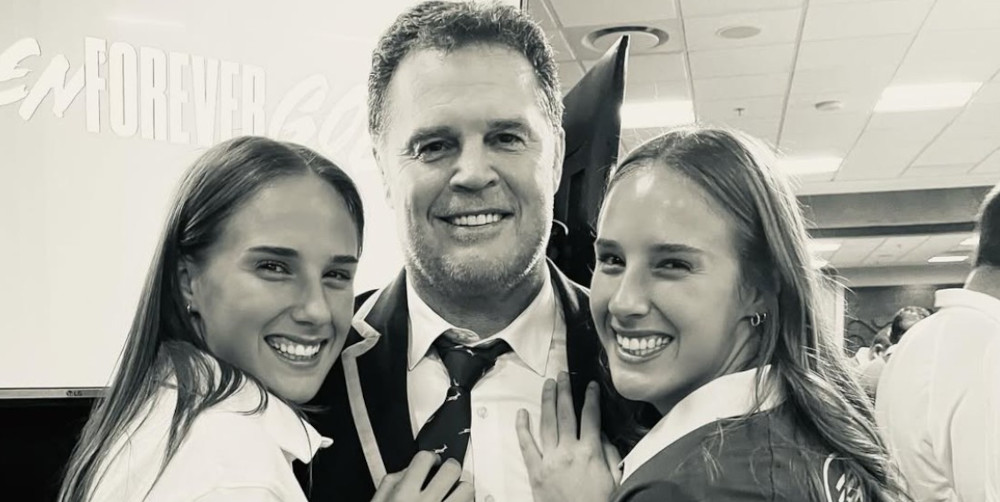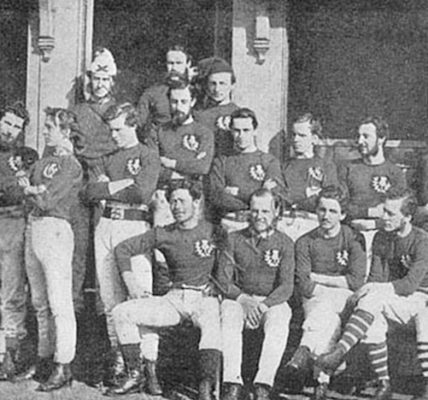There’s a tenderness to certain moments that even years of stadium noise and media scrutiny can’t harden. For Rassie Erasmus, Springbok coach and rugby icon, that moment came not on the field, but somewhere quieter, warmer, and far more personal. In July, he stood beside his twin daughters, Carli and Nikki, as they celebrated their 21st birthday in full cowboy-themed joy, surrounded by friends, family, and the subtle hum of a life that’s managed, somehow, to remain deeply human amid the chaos of South African sport.
The images from that celebration made their way onto social media soon after. Rassie, relaxed in jeans and boots, flanked by his daughters, both dressed with a kind of carefree flair that only 21-year-olds can manage. It was a simple caption, “Happy 21st”, but the emotion threaded through it was clear. This wasn’t a performative post. It was a father marking a milestone, not just for his daughters, but for himself. Because when your life is measured in test matches, tactical shifts, and World Cup campaigns, these kinds of personal moments don’t just appear, they’re hard-earned.
The party was, by all accounts, lively but not extravagant. A Western theme brought out denim jackets, fringe details, boots polished for the occasion. Younger sister Jani was there too, alongside their mother and Rassie’s ex-wife, Nicolene. There were smiles, group photos, and the familiar ease of a family that’s seen both its highs and lows but chosen grace over conflict. In many ways, the photo said more than any matchday press conference ever could. Because here was Erasmus not as a strategist, not as a polarising figure in world rugby, but as a father celebrating his children stepping fully into adulthood.
It takes something special to hold onto softness when you’ve spent a career in the unforgiving grind of elite sport. Erasmus, who has coached under pressure so intense it sometimes borders on surreal, has always carried himself with a certain honesty. His presence in rugby is well-known, he’s the man with the plans, the provocateur when needed, the protector of his players, the lightning rod for criticism. But his role as a father has largely remained in the background, until now. And what emerged during this family milestone was a sense of quiet commitment. To being there. To showing up. To knowing when rugby needs to step aside for something more enduring.
The reaction from the public was telling. Fans flooded the comment sections with heart emojis, respectful applause, and a kind of collective sigh. Because in a year where the news cycle feels permanently set to stress, a moment of realness, of joy, of love, of family, was both surprising and oddly comforting. Rassie Erasmus, so often depicted through the high-stakes lens of Springbok campaigns and IRB scrutiny, was simply a dad watching his daughters blow out candles. And people responded to that. Not with frenzy, but with warmth. It was a reminder that even heroes of the game are grounded in relationships, in shared laughter, in fleeting moments like this.
It hasn’t been a straightforward year for Erasmus. His public and professional life remains intense, with the Springboks preparing for new challenges under his leadership and expectations from fans never dipping below fever pitch. But away from the tactical board and the headline machines, the celebration in July revealed something more personal. The ability to pivot, to be present. And that presence, being physically and emotionally there for his children, is something that doesn’t get measured in career statistics.
 Carli and Nikki themselves have largely avoided the public spotlight, a choice that seems deliberate and respected. Their birthday marked not just a milestone of age, but a kind of gentle emergence. Not into fame, but into recognition, as individuals with their own paths, shaped no doubt by their father’s complex world, but not defined by it. Their birthday celebration wasn’t about celebrity or scale. It was about a family that’s evolved, that still finds ways to celebrate each other, even as circumstances shift.
Carli and Nikki themselves have largely avoided the public spotlight, a choice that seems deliberate and respected. Their birthday marked not just a milestone of age, but a kind of gentle emergence. Not into fame, but into recognition, as individuals with their own paths, shaped no doubt by their father’s complex world, but not defined by it. Their birthday celebration wasn’t about celebrity or scale. It was about a family that’s evolved, that still finds ways to celebrate each other, even as circumstances shift.
For many in South Africa, especially those who’ve grown up with the rougher edges of rugby culture, these kinds of public family moments hit a different chord. They offer a model not of perfection, but of presence. A reminder that even the busiest lives can make room for real connection. And maybe, more importantly, a reminder that success isn’t always about what happens on the pitch. Sometimes it’s about the quiet work done off it. The listening. The forgiving. The returning.
It’s easy to forget how young professional coaches still are when viewed outside their profession. Rassie, at 51, has spent more than half his life inside rugby systems that demand results above all else. But at home, around that birthday table, none of that matters. The scoreboard is replaced with stories, with music, with maybe a speech or two. There are no tactical reviews, just toasts. And maybe, for a night, the rest of the world falls away.
There’s something lasting about that kind of evening. The kind of memory that will sit with Carli and Nikki long after media headlines fade and rugby seasons cycle on. Years from now, they’ll remember who was there, what was said, how their father looked when he raised his glass. And if that becomes the standard they hold other relationships to, then maybe that’s Rassie’s greatest victory of all.
In a world where public figures are often reduced to their professional output, moments like this allow for a richer kind of narrative. One not built on wins or controversies, but on connection. On vulnerability. On the small, ordinary acts of love that reveal who we really are beneath the spotlight. For Rassie Erasmus, the birthday of his daughters wasn’t just a celebration, it was a subtle declaration. That in the middle of pressure, fame, and expectation, he’s still anchored. Still grounded. Still, at his core, a father first.




